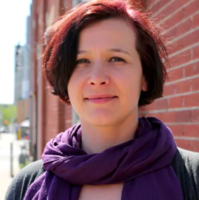Getting to Know Acclaimed Poet & Novelist Katherena Vermette, Author of the New Collection river woman
A new book from Métis poet and novelist Katherena Vermette is a big event – both her poetry and her prose have resonated deeply with readers and critics alike (earning her numerous honours including the Amazon.ca First Novel Award, a Governor General's Literary Award for Poetry, and nominations for a dozen additional prizes). Her second collection of poems, river woman (House of Anansi Press), positions love as a postcolonial force, a reparative tool that faces off against trauma both personal and collective.
Exploring language, the body, and the connection between the two, river woman is a gift for poetry lovers and Vermette's many fans. It captures her sparse, powerful voice, its lean beauty radiating off the page as she contemplates the natural world and weaves her learning of Anishnaabemowin ("the language / I should have already known") into the poems.
We're thrilled to welcome Katherena to Open Book today to take our version of the famous Proust Questionnaire, a kind of personality quiz beloved by its namesake author, which lets us get to know the people behind the pages. She tells us about her favourite occupations (we concur!), the perfect shade of blue, and shares her three inspiring and memorable mottos for life.
What is your dream of happiness?
Peace, quiet, warmth, hugs, balance.
What is your idea of misery?
The opposite of the above – chaos, needless noise, cold, loneliness.
Where would you like to live?
Someplace quiet with a view of water – oceans are stunning, but that would take me very far from home, so a lake or a river would do. I have always lived in the city and idealized country living, but really it scares me – what do you do with all that darkness and bad internet?
What qualities do you admire most in a man? What qualities do you admire most in a woman?
The answer for all humans is the same – kindness.
What is your chief characteristic?
My husband would say stubbornness, my children would say overbearing-ness, my worst self would say rage, my best self would say love.
What is your principal fault?
I don’t speak up when I should and let things build. That leads to the inevitable explosion, and then I speak up when I shouldn’t.
What is your greatest extravagance?
Books.
Your CanLit News
Subscribe to Open Book’s newsletter to get local book events, literary content, writing tips, and more in your inbox
What faults in others are you most tolerant of?
When people say they just don't know something, when they own that ignorance without posturing and seek education.
What do you value most about your friends?
Laughter, solidarity, more hugs.
What characteristic do you dislike most in others?
Anger.
What characteristic do you dislike most in yourself?
Anger.
What is your favourite virtue?
Stoicism.
What is your favourite occupation?
Organizing, and dog walking.
What would you like to be?
Perfect.
What is your favourite colour?
Blue - morning sky kind of blue.
What is your favourite flower?
Wild ones.
What is your favourite bird?
I just came from Alberta so today it’s the magpie. I know people think they’re nuisances but damn, they are good looking.
What historical figure do you admire the most?
Going full Metis on this one - Riel.
What character in history do you most dislike?
John A. – same reason... and many, many other reasons.
Who are your heroes in real life?
Youth.
What natural talent would you most like to possess?
Poise.
How do you want to die?
Old.
What is your motto?
Maya Angelou – people will forget what you said, people will forget what you did, but people will never forget how you made them feel.
Michelle Obama – when they go low, we go high.
We are here to honour our ancestors and make a place for our children. This is the only job we have that matters.
_________________________
Katherena Vermette is a Métis writer from Treaty One territory, the heart of the Métis nation, Winnipeg, Manitoba, Canada. Her first book, North End Love Songs (The Muses Company), won the Governor General’s Literary Award for Poetry. Her NFB short documentary, this river, won the Coup de Coeur at the Montreal First Peoples Festival and a Canadian Screen Award. Her first novel, The Break, is the winner of three Manitoba Book Awards and the Amazon.ca First Novel Award, and it was a finalist for the Governor General’s Literary Award for Fiction, the Rogers Writers’ Trust Fiction Prize, and CBC Canada Reads.





